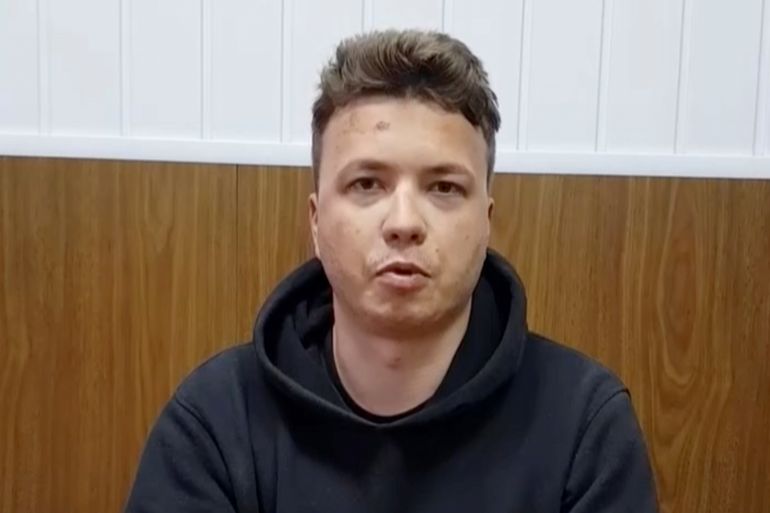‘Belarusian journalists are unsafe and constantly under attack’
A legal expert with the Belarusian Association of Journalists discusses her fears for Roman Protasevich, the reporter detained after a forced plane diversion to Minsk.

On Sunday, Belarusian authorities detained journalist Roman Protasevich and his partner Sofia Sapega after President Alexander Lukashenko ordered the plane they had been travelling on to divert to Minsk.
Until November last year, Protasevich managed the Telegram channel, Nexta, which played a crucial role in organising opposition protests following a disputed election last August that handed Lukashenko victory.
Keep reading
list of 4 itemsGeorgia advances ‘foreign agents’ bill as 20,000 rally against it
Lawmakers brawl as Georgian Parliament considers ‘foreign agent’ bill
Journalist loses foot after being badly wounded in Israeli attack in Gaza
With two million followers, the channel became a popular communications tool for getting past authorities.
According to the Belarusian Association of Journalists, Protasevich’s detention is part of a larger crackdown on the independent press in Belarus.
It says Belarusian authorities blocked 50 independent websites and arrested 477 journalists in 2020.
Al Jazeera spoke to Volha Siakhovich, a Belarus-based legal expert from the Belarusian Association of Journalists about the Protasevich episode and media freedom.
Al Jazeera: Belarusian authorities released a video where Protasevich states that he is in good health and that police are treating him according to law. What did you make of that video?
Siakhovich: We can see he is alive, but everyone who has come out of detention in Belarus will confirm that the prison conditions are inhumane.
I have heard journalists describing being confined to cold cells without any access to hygiene, medical aid and toilets. Political prisoners are often kept in cold temperatures, and the prison guards will make sure they don’t get any sleep because loud music is blasted and a bright light is shone into the cells.
Other accounts involve overcrowding with up to 10 people in a small cell without ventilation.
Al Jazeera: What are your fears for Protasevich?
Siakhovich: At the moment, he faces three criminal charges for organising mass riots, active participation in group actions that grossly violate public order and incitement of social disorder. For this, he could be facing up to 15 years in prison.
But Belarusian courts are not transparent and more charges could come his way at any moment. Belarus is also the last European country to have a death penalty. This is not out of [the question] for Protasevich yet. The courts can fabricate anything and everything out of the blue.
Al Jazeera: It seems Lukashenko diverted the passenger aircraft in order to arrest Protasevich. Why is the 26-year-old viewed as a threat to Belarus?
Siakhovich: I don’t see into Lukashenko’s head, so I can’t tell you why he decided to break international law to arrest a journalist. However, it seems that Protasevich is considered to be an important enemy of the state for his blogging work during the elections and their aftermath.
During the protests and internet blackouts enforced by Lukashenko, the Nexta channel played a key role in organising protesters, helping them get past the authorities.
Protasevich had been living in exile due to safety concerns after the authorities alleged he was involved in making a documentary, Lukashenko, Criminal Materials, published on Nexta’s YouTube channel.
In November 2020, the Minsk office of the Investigative Committee of the Republic of Belarus charged Protasevich, in connection with the developments around the presidential elections on August 9, 2020. The State Security Committee (KGB) also put him in the List of Organisations and Individuals Involved in Terrorist Activities.
Al Jazeera: There are no upcoming elections or major protests planned. Why now?
Siakhovich: The operation was most likely prepared by Belarusian secret services long in advance. There seems to be little logic in why they did so one day before the European Summit in Brussels. What happened shows that Protasevich’s work was a serious threat to Lukashenko, meaning he was doing important work.
Al Jazeera: What are your biggest concerns regarding the safety of journalists in Belarus right now?
Siakhovich: The most worrying are the prison conditions I already mentioned, as they put people’s health in danger.
This should be of biggest concern and focus of international attention.
Foreign media and human rights groups can help by raising awareness over the torture and safety risks in Belarusian prisons.
Al Jazeera: What is the role of journalists in Belarus today?
Siakhovich: From the way Belarusian authorities react to independent journalists, we can assume that journalists have a very important task ahead of them. Their time to initiate a long-awaited change in Belarus has come.
The narrative told by the authorities is that journalists generate information against the state as part of some larger Western conspiracy.
When journalists land in the hands of authorities, the state is free to do as it pleases. The authorities seldom respect the law, engaging in torture, fabricating false claims and charging journalists with crimes they never committed.
One thing that is clear is that Belarusian journalists are unsafe and constantly under attack.
As we speak, the offices of the independent media Tut.by are being guarded by police cars and a lot of their staff had been charged with various crimes.
Protasevich is just one of the 34 Belarusian journalists currently in prison.